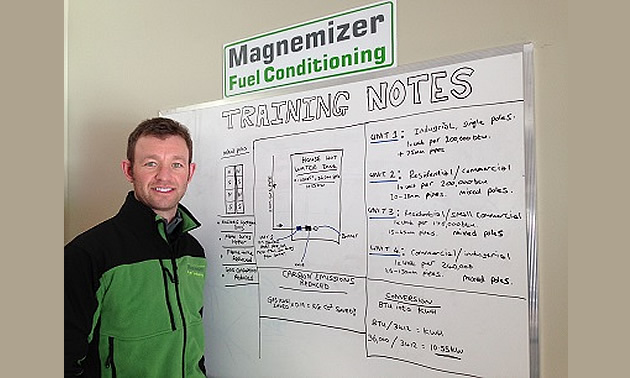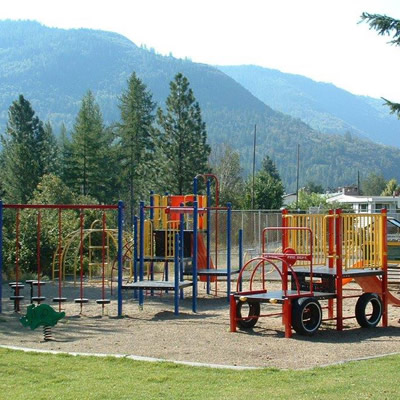KRIC celebrates success at Kimberley’s Magnemizer Fuel Conditioning Inc.

— Photo courtesy KRIC e-newsletter
Being big fans of technology, especially technology that provides financial and environmental benefits, we at KRIC were pretty excited about this month’s success story.
“I’m a skeptical person by nature,” explains Shane Stewart, owner of Kimberley-based Magnemizer Fuel Conditioning Inc, “but when I looked further into the technology and some of the hard numbers and testimonials provided by customers, it was hard not to be convinced.”
Very enthusiastic about his recent move to bring a proven gas-saving technology, widely in use in Europe, to Canada, he explained, “I first heard about this technology in 2010 from a friend who owns a successful business in England, Magnatech, in this same field. He was looking for me to open up a Canadian branch, but I wasn’t ready to take the leap until last year.”
According to Shane, the concept is fairly simple. You take some of the strongest magnets in the world (neodymium), lay them out in a particular pattern, install them on the fuel pipe close to the boiler or furnace firing chamber, and the magnetic field will penetrate the pipe, causing the ions inside the gas to stand up on end. As a result of this “standing to attention" the fuel burns hotter and more completely.
As Shane explains, “Using the magnets means that the boiler or furnace gets up to its desired temperature faster, so the thermostat turns off the device sooner, using less fuel. We can easily prove by looking at the numbers and talking to our customers that the magnets will save anywhere from 6-12% on your gas bill.”
He added, “The bonus is that there’s a substantial reduction in the greenhouse gases produced as well, which is extremely important for larger companies in Canada who are being told that they have to lower their carbon footprint by a certain percentage every year.”
With the value of the magnets having been proved in the UK and Europe with customers such as the Royal Navy, Heinz, Pfizer and Lily, Shane is confident there is a great fit for Canadian businesses as well.
Things like hotels, schools, hospitals, and swimming pools where there is a lot of heating being done, and pulp and chip mills where gas is used to dry wood, can save significant amounts of money with a very quick return on their initial investment.
“Take the average hotel in the Kootenays,” explains Shane. “which is generally spending $20-$55,000 a year on gas. At 6% savings (the minimum), that’s $1200 – $3300 each and every year.”
“John Lewis, a major department store franchise in the UK, installed the magnets in 1 store and the cost of the installation was paid for within 1 year. They’ve now given Magnatech the go-ahead to do an additional 230 stores.”
With an average return on investment of 2 - 3 years, the numbers just make sense.
According to Shane, you’ll always save money with this system, the only question is how much. Several factors influence the level of reduction including pipe layout, whether the pipes are steel or stainless steel, the age of the boiler and furnace, and the quality of the thermostat.
Having launched the company officially in January of 2014, Magnemizer has already installed two pilot systems on sites owned by the City of Kimberley.
Later this year, the numbers will be in, and Shane is confident that the pilot will be a success.
“We fully expect that the City will be impressed with the cost savings and will be looking to roll this out to other buildings. Think about the amount of gas that’s required to heat the Aquatic Centre – there’s a huge opportunity to lower gas consumption there as well,” he says.
Located in Marysville, this upcoming year will be a big one for Magnemizer, with their review of their first large scale installations for the City of Kimberley, an upcoming re-brand and the on-boarding of a new marketing and advertising manager, Maurice Fritz.
“We really only launched officially in January,” explains Shane, “and with some new blood, a fresh focus, and the validation of our direction during the KRIC and Discovery Parks mentor panels in May, we’re hoping to make big leaps in our penetration of the Canadian market.”
Source: KRIC e-newsletter





Comments